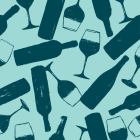Fine wine sales boosted by pandemic
The COVID-19 pandemic has led to an increased interest in fine wine among British consumers, according to new research from Bordeaux Index.
Of 500 respondents polled in August 2021, 73% reported spending more on fine wine than they did at the start of the March 2020 lockdown. Nearly half (46%) said they did so initially to treat themselves to some luxury during a difficult period, but almost nine in 10 (86%) say they plan to continue incorporating fine into their lifestyles.
Consumers are also looking to fine wine as an opportunity for investment, with 27% of respondents claiming this to be their sole reason for purchasing luxury wines. Some 41%, meanwhile, said they have always had an interest in fine wine, but an increase in disposable income means they are only now able to buy it.
Speaking to the drinks business, Bordeaux Index director Matthew O’Connell said: “I believe there is a combination of two related key factors here: one is people reassessing their priorities as a result of lockdown – if they found a new appreciation for fine wine or other luxury items during lockdown, they want to maintain or grow this; and secondly, for the most part disposable income in many relevant (in this context) consumer segments grew materially during the pandemic.”
Chateau d’Yquem postpones 2019 release as it enters a ‘new chapter’
Sauternes powerhouse Chateau d'Yquem has announced it will postpone this month’s release of the 2019 vintage until next March, stating that it is embarking on an “ambitious strategy” for the wine as it “enters a new chapter”.
According to CEO Pierre Lurton, the postponement will allow the estate to “optimise the ‘élevage’ of the 2019 vintage”, and give the property the opportunity to work with partners in its key markets to roll out marketing campaigns in the first months of 2022.
Meanwhile, Lurton revealed that d'Yquem, the property’s dry white wine, will be released for the first time on its own on 21 September. “With only about half a normal crop, we have decided to release 95% of the production which we already know will unlikely be enough to satisfy the demand,” he said.
Lurton added that the changes formed part of an “ambitious strategy” that they would be implemented with the help of new additions to the team: commercial director Mathieu Jullien and technical director Lorenzo Pasquini, who both joined a year ago.
“I am very excited about the opening of this new chapter for Château d’Yquem and I am convinced that together we will make it a success,” he concluded.
Chateau Latour releases new stocks of 2005 vintage
Lauded Bordeaux First Growth Chateau Latour has released new cases of the acclaimed 2005 vintage from its cellars.
Earlier this year, a spokesperson for the chateau revealed that this would mark “the last commercial release of this wine”. The new ex-cellar stock is priced around £8,900 per 12-bottle case in bond.
Regarded as one of the finest wines from what is considered a five-star best Bordeaux vintage, Latour 2005 joins the wave of September fine wine releases via Place de Bordeaux. Other big names that have released so far include Opus One 2018, Inglenook Rubicon 2018, Almaviva 2019 and Clos Apalta 2018, with more set to follow.
South Korea is now the world’s ‘second most attractive’ wine market
South Korea is closing the gap between itself and the US as the most sought-after global wine market, a new report from Wine Intelligence shows.
According to The Global Compass Report, South Korea jumped eight places in 2020 to take second place for the world’s ‘most attractive global wine market’. This year it has not only retained its position but is inching closer to its nearest rival.
“Wine growth in the US is tailing off, whereas still wine volume in South Korea grew by more than +11% CAGR 2016-2020, according to IWSR Drinks Market Analysis,” said Lulie Halstead, CEO at Wine Intelligence.
After the US and South Korea, the remaining top five ranked markets in the study are the UK, Ireland, and Germany, which all saw strong wine volumes during the year. The report notes that Colombia has joined Brazil, Poland, Romania, South Korea, and Singapore as a ‘growth’ market in 2021, with Mexico and Russia falling from that category down into the ‘emerging’ wine markets category.
Scandinavia shows English and Welsh wine a lot of love
Despite ongoing pandemic disruption, exports of English and Welsh wine have continued to soar over the last 12 months, according to Wine GB.
Sales rose by 51% during this period, with Scandinavia account for a whopping 63% of all exports.
Wines from these isles have proven particularly popular with drinkers in Norway. Speaking to the drinks business, Wine GB chair Sam Linter said: “I think there is a genuine interest in all things English. Norway really likes and connects with English culture, and Norwegian consumers also have diverse tastes. They’re more open-minded to trying different styles of wine.”
However, Linter noted that this hasn’t come as a sudden surprise. “Exports of English wine to Scandinavia have been gradually increasing over the last five to seven years, and that growth has been sustained,” he said. “It’s been more of a steady climb than a sudden spike. I can see the upward trajectory continuing.”
Wine GB added that still wine sales from England and Wales now represent 17% of the UK’s total exports – a figure that would have been unthinkable only a few years ago.






